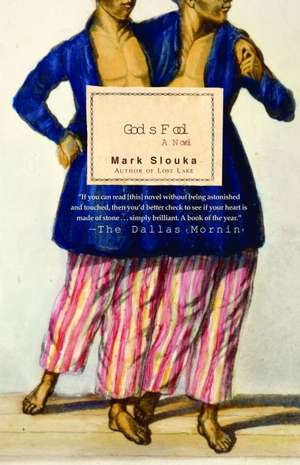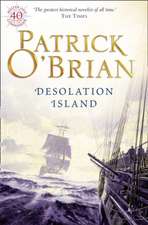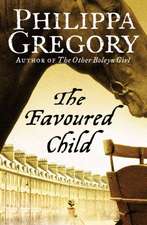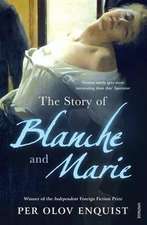God's Fool: Vintage Contemporaries
Autor Mark Sloukaen Limba Engleză Paperback – 30 iun 2003
Vezi toate premiile Carte premiată
ALA Notable Books (2003)
Despite the incomparable predicament of their physical condition, Chang is wrapped in ordinary grace and suffering, searching for tranquility as he travels from Siam’s marketplace to Parisian salons, to London’s underworld and P.T. Barnum’s side show, all the while improbably connected to a man who becomes his sworn enemy. In a last attempt at a normal life, Chang and Eng retire from the sideshow and move to the American South where they marry two sisters and Chang finds short-lived peace and redemption in his love for his son Christopher. This peace, however, is overtaken as events in their adopted home country force them into a final terrifying battle with fate.
| Toate formatele și edițiile | Preț | Express |
|---|---|---|
| Paperback (1) | 115.94 lei 6-8 săpt. | |
| Vintage Publishing – 30 iun 2003 | 115.94 lei 6-8 săpt. | |
| (1) | 57.77 lei 6-8 săpt. | |
| MACMILLAN – 5 ian 2012 | 57.77 lei 6-8 săpt. |
Din seria Vintage Contemporaries
-
 Preț: 109.95 lei
Preț: 109.95 lei -
 Preț: 101.80 lei
Preț: 101.80 lei -
 Preț: 96.52 lei
Preț: 96.52 lei -
 Preț: 107.46 lei
Preț: 107.46 lei -
 Preț: 91.77 lei
Preț: 91.77 lei -
 Preț: 100.35 lei
Preț: 100.35 lei -
 Preț: 111.51 lei
Preț: 111.51 lei -
 Preț: 96.11 lei
Preț: 96.11 lei -
 Preț: 96.93 lei
Preț: 96.93 lei -
 Preț: 97.34 lei
Preț: 97.34 lei -
 Preț: 111.92 lei
Preț: 111.92 lei -
 Preț: 117.87 lei
Preț: 117.87 lei -
 Preț: 95.92 lei
Preț: 95.92 lei -
 Preț: 113.56 lei
Preț: 113.56 lei -
 Preț: 101.88 lei
Preț: 101.88 lei -
 Preț: 108.09 lei
Preț: 108.09 lei -
 Preț: 115.42 lei
Preț: 115.42 lei -
 Preț: 106.04 lei
Preț: 106.04 lei -
 Preț: 119.87 lei
Preț: 119.87 lei -
 Preț: 90.64 lei
Preț: 90.64 lei -
 Preț: 87.84 lei
Preț: 87.84 lei -
 Preț: 99.60 lei
Preț: 99.60 lei -
 Preț: 105.41 lei
Preț: 105.41 lei -
 Preț: 99.30 lei
Preț: 99.30 lei -
 Preț: 120.26 lei
Preț: 120.26 lei -
 Preț: 103.74 lei
Preț: 103.74 lei -
 Preț: 100.98 lei
Preț: 100.98 lei -
 Preț: 100.76 lei
Preț: 100.76 lei -
 Preț: 89.19 lei
Preț: 89.19 lei -
 Preț: 115.94 lei
Preț: 115.94 lei -
 Preț: 101.24 lei
Preț: 101.24 lei -
 Preț: 125.13 lei
Preț: 125.13 lei -
 Preț: 89.50 lei
Preț: 89.50 lei -
 Preț: 132.88 lei
Preț: 132.88 lei -
 Preț: 139.63 lei
Preț: 139.63 lei -
 Preț: 93.85 lei
Preț: 93.85 lei -
 Preț: 106.45 lei
Preț: 106.45 lei -
 Preț: 89.91 lei
Preț: 89.91 lei -
 Preț: 107.92 lei
Preț: 107.92 lei -
 Preț: 77.02 lei
Preț: 77.02 lei -
 Preț: 125.21 lei
Preț: 125.21 lei -
 Preț: 99.75 lei
Preț: 99.75 lei -
 Preț: 112.11 lei
Preț: 112.11 lei -
 Preț: 83.94 lei
Preț: 83.94 lei -
 Preț: 97.15 lei
Preț: 97.15 lei -
 Preț: 105.82 lei
Preț: 105.82 lei -
 Preț: 87.13 lei
Preț: 87.13 lei -
 Preț: 111.76 lei
Preț: 111.76 lei -
 Preț: 129.78 lei
Preț: 129.78 lei -
 Preț: 100.57 lei
Preț: 100.57 lei
Preț: 115.94 lei
Nou
Puncte Express: 174
Preț estimativ în valută:
22.19€ • 23.08$ • 18.32£
22.19€ • 23.08$ • 18.32£
Carte tipărită la comandă
Livrare economică 15-29 aprilie
Preluare comenzi: 021 569.72.76
Specificații
ISBN-13: 9780375702099
ISBN-10: 0375702091
Pagini: 288
Dimensiuni: 132 x 203 x 15 mm
Greutate: 0.21 kg
Editura: Vintage Publishing
Seria Vintage Contemporaries
ISBN-10: 0375702091
Pagini: 288
Dimensiuni: 132 x 203 x 15 mm
Greutate: 0.21 kg
Editura: Vintage Publishing
Seria Vintage Contemporaries
Notă biografică
Mark Slouka's story "The Woodcarver's Tale" won a National Magazine Award in Fiction for Harper's in 1995. He is a graduate of Columbia and has taught at Columbia, Harvard, Penn State, and the University of Virginia. He lives in California with his wife and two children. Lost Lake is his first work of fiction
Extras
In a vertical world, a world of men like pines, or posts, more separate than they know, we were born with a bridge. A small, fleshy bridge, a handspan long and half as thick (thick enough for a boy to march his soldiers across if he watched their steps and they kept in file), forever connecting our two principalities like an act of God, the will of the citizens to hate one another be damned. If a life were measured by the number of metaphors it gives occasion to, the opportunities it presents to journalistic hacks and carnival barkers, ours has been rich indeed; in the field of grammar alone we have been wealthy beyond measure, a veritable primer made flesh. We were the hyphenated twins, as that nice young man writing for La Quotidienne once put it. We were a living conjunction, an if or an and or a but where a full stop would have been both correct and kind. We were separate sentences spliced with a comma, an error come alive. I could go on.
The day we were born, the midwives ran from our monstrous birth, leaving our mother to cut her own cord, untwist and bathe us. Twenty years later, the citizens of two continents came running to stare. I despised them about equally. I never changed. I see this now as my essential trait: Pushed to the wall by man or God, I pushed back. If the world showed its teeth, I rubbed it against the fur. I was born that way, and if I were to live to be as old as Methuselah, I'd be that way still.
Little Charlie Stratton, who could stand in a teacup, once preached me a sermon on Christian acceptance. "We must accept our fate with humility and gratitude," he hectored me in that mad-duck voice of his, and I remember being tempted to add, "and milk it like an udder until it runs dry," but didn't, distracted, I suppose, by the furious little digit he poked at my stomach with each stressed syllable (ac-cept our fate with hu-mi-lity and gra-titude), like a schoolteacher trapped in a child's dream. Oh, but how he made us cringe, Barnum's "little brick," posing and primping for councillors and queens: now Romulus bravely attacking a vase, now Cain with a club the size of a quill, now Crusoe in furs like a shipwrecked squirrel. But we were separate cases, Charlie and I. Humility is prudent when you're the size of a hat.
Acceptance was not in my nature. Even as a young man it seemed to me that everywhere the world conspired against the heart, and though I knew the heart would lose, I couldn't bear to call it right. It seemed unjust to me that those we had come to know should have to leave us, that the mowers resting in the shade had to rise, that perfection passed. Gideon liked to claim that my melancholy grew the more I watered it, but it wasn't the wine that made the passing of things so hard for me, just as it isn't the port by my side that makes me miss him now. No, like God, I had a jealous nature. I would have kept him here, you see. Drawn a circle around him, as I would around all the ones I've known and loved. And some besides. And in that circle, their heads thrown back through a warm ray of sun (the mark of my benediction), the mowers could laugh forever, one leg up and one leg out as the handles of their tools slowly moldered to dust and the blades of their scythes sank down in the grass. But the circle didn't hold. I couldn't hold it. Except once, maybe.
Before the attack on Cemetery Ridge, they say, Pickett's men waited in the woods by the edge of the open fields, watching the milkweed drifting in the air like a lost squall. They knew. Every man and boy among them. Some scribbled quick notes against the stocks of their rifles or their brothers' backs or the stones of the old mossed walls that ran through those woods like stitches through a quilt, marking borders long forgotten–"To Miss Masie," "To My Father," "In Case of My Death"–then pinned them to their shirts. Most just sat with their backs against the trees, their caps hung lightly on their bayonets, waiting.
No one spoke. A bee buzzed on a turtlehead blooming in the damp, climbed up the tongue. A hot blade of sun lit the moss on a boulder, cut the toes off a boot. Here and there men lay sprawled on the previous season's leaves, staring up through the layered branches as if into the milky eye of heaven itself. Further off, where an old road cut light through the roof of leaves, a photographer in a black vest and a wide-brimmed hat went about his business, hurrying back and forth from a small, square wagon.
Suddenly a canteen went over with a clank; a cut leaf twirled slowly to the ground. Like sleepers waking, they raised their heads. A private's hat flew from a branch. They leaped to their feet. The floor of the forest, an overgrown orchard, was stippled with apples, small and hard as hickory nuts. Within seconds the shade was alive with joyful, savage shouting. Men sprinted for the breastworks of pasture walls and broken trees, one hand holding their caps to their heads, the other cradling their bulging shirts, lumpy with ammunition. Some said afterward that a strange sort of dream seemed to come over that glade. For a short space of time, they one and all seemed to forget where they were. The wavering heat, the ridge, the order–soon to come–to advance across the open fields (an order Longstreet himself would have to give with a nod, unable to bring himself to speak): All these faded away like distance on a summer afternoon, and they played. As children will play. As though death were a story to scare them to bed, and scarce worth believing.
And I ask you: What manner of God would stop them? Would bring down his foot? Would turn them, laughing, to blood and bone?
I see Christopher there, my little boy grown tall and lean, his wrists protruding a full three inches from the sleeves. I can feel his thrill at a solid hit, the sting of a little green ball in his side. I've imagined myself there so often now that my imagining has taken on the color of memory. You say this is wrong? Who was it, I want to know, who first divided history from dream, who ran his finger down the ranges of the past and decreed a frontier where none had been? When was the treaty that gave us this damnable map, and who gave it authority? No, I'll say it once and be done with it: There is no frontier, in this world or any other, that love or desire or pain can't cross.
From the Hardcover edition.
The day we were born, the midwives ran from our monstrous birth, leaving our mother to cut her own cord, untwist and bathe us. Twenty years later, the citizens of two continents came running to stare. I despised them about equally. I never changed. I see this now as my essential trait: Pushed to the wall by man or God, I pushed back. If the world showed its teeth, I rubbed it against the fur. I was born that way, and if I were to live to be as old as Methuselah, I'd be that way still.
Little Charlie Stratton, who could stand in a teacup, once preached me a sermon on Christian acceptance. "We must accept our fate with humility and gratitude," he hectored me in that mad-duck voice of his, and I remember being tempted to add, "and milk it like an udder until it runs dry," but didn't, distracted, I suppose, by the furious little digit he poked at my stomach with each stressed syllable (ac-cept our fate with hu-mi-lity and gra-titude), like a schoolteacher trapped in a child's dream. Oh, but how he made us cringe, Barnum's "little brick," posing and primping for councillors and queens: now Romulus bravely attacking a vase, now Cain with a club the size of a quill, now Crusoe in furs like a shipwrecked squirrel. But we were separate cases, Charlie and I. Humility is prudent when you're the size of a hat.
Acceptance was not in my nature. Even as a young man it seemed to me that everywhere the world conspired against the heart, and though I knew the heart would lose, I couldn't bear to call it right. It seemed unjust to me that those we had come to know should have to leave us, that the mowers resting in the shade had to rise, that perfection passed. Gideon liked to claim that my melancholy grew the more I watered it, but it wasn't the wine that made the passing of things so hard for me, just as it isn't the port by my side that makes me miss him now. No, like God, I had a jealous nature. I would have kept him here, you see. Drawn a circle around him, as I would around all the ones I've known and loved. And some besides. And in that circle, their heads thrown back through a warm ray of sun (the mark of my benediction), the mowers could laugh forever, one leg up and one leg out as the handles of their tools slowly moldered to dust and the blades of their scythes sank down in the grass. But the circle didn't hold. I couldn't hold it. Except once, maybe.
Before the attack on Cemetery Ridge, they say, Pickett's men waited in the woods by the edge of the open fields, watching the milkweed drifting in the air like a lost squall. They knew. Every man and boy among them. Some scribbled quick notes against the stocks of their rifles or their brothers' backs or the stones of the old mossed walls that ran through those woods like stitches through a quilt, marking borders long forgotten–"To Miss Masie," "To My Father," "In Case of My Death"–then pinned them to their shirts. Most just sat with their backs against the trees, their caps hung lightly on their bayonets, waiting.
No one spoke. A bee buzzed on a turtlehead blooming in the damp, climbed up the tongue. A hot blade of sun lit the moss on a boulder, cut the toes off a boot. Here and there men lay sprawled on the previous season's leaves, staring up through the layered branches as if into the milky eye of heaven itself. Further off, where an old road cut light through the roof of leaves, a photographer in a black vest and a wide-brimmed hat went about his business, hurrying back and forth from a small, square wagon.
Suddenly a canteen went over with a clank; a cut leaf twirled slowly to the ground. Like sleepers waking, they raised their heads. A private's hat flew from a branch. They leaped to their feet. The floor of the forest, an overgrown orchard, was stippled with apples, small and hard as hickory nuts. Within seconds the shade was alive with joyful, savage shouting. Men sprinted for the breastworks of pasture walls and broken trees, one hand holding their caps to their heads, the other cradling their bulging shirts, lumpy with ammunition. Some said afterward that a strange sort of dream seemed to come over that glade. For a short space of time, they one and all seemed to forget where they were. The wavering heat, the ridge, the order–soon to come–to advance across the open fields (an order Longstreet himself would have to give with a nod, unable to bring himself to speak): All these faded away like distance on a summer afternoon, and they played. As children will play. As though death were a story to scare them to bed, and scarce worth believing.
And I ask you: What manner of God would stop them? Would bring down his foot? Would turn them, laughing, to blood and bone?
I see Christopher there, my little boy grown tall and lean, his wrists protruding a full three inches from the sleeves. I can feel his thrill at a solid hit, the sting of a little green ball in his side. I've imagined myself there so often now that my imagining has taken on the color of memory. You say this is wrong? Who was it, I want to know, who first divided history from dream, who ran his finger down the ranges of the past and decreed a frontier where none had been? When was the treaty that gave us this damnable map, and who gave it authority? No, I'll say it once and be done with it: There is no frontier, in this world or any other, that love or desire or pain can't cross.
From the Hardcover edition.
Recenzii
"If you can read [this] novel without being astonished and touched, then you'd better check to see if your heart is made of stone . . . simply brilliant. A book of the year." —The Dallas Morning News
"Slouka writes with the bare-bones ferocity of Jerzy Kosinski and the visual intensity of John Updike." —Boston Herald
“Exceptionally beautiful. . . . [A] story where the power of language and of reflection on the nature of connection is more essential, and compelling, than any retelling of historical events.” —The Washington Post Book World
"Slouka writes with the bare-bones ferocity of Jerzy Kosinski and the visual intensity of John Updike." —Boston Herald
“Exceptionally beautiful. . . . [A] story where the power of language and of reflection on the nature of connection is more essential, and compelling, than any retelling of historical events.” —The Washington Post Book World
Premii
- ALA Notable Books Winner, 2003












